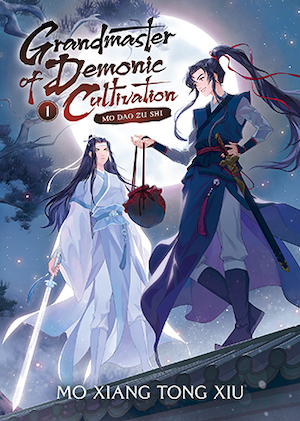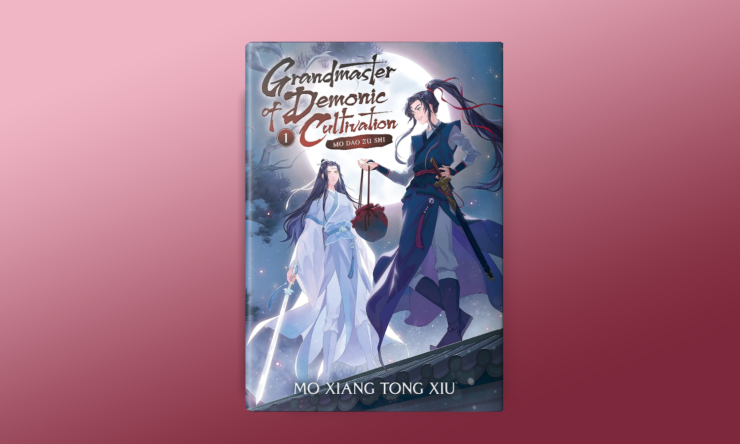I figured we should finish our big gay book-club at the same place we started: the “resurrection and revenge” (among other things!) of the infamous Wei Wuxian, in Grandmaster of Demonic Cultivation (魔道祖师 / Mó Dào Zǔ Shī). Whether we’re talking fans whose fingernails got thoroughly gnawed awaiting the translations, or entirely new readers just discovering Mo Xiang Tong Xiu, this is probably the series they recognize at a glance. And honestly, if you’re a gay person online, the iconic image of two bunnies—one white and one black, sporting respective white and red ribbons—has probably crossed your timeline at some point.
As for me, separating my initial read of Grandmaster of Demonic Cultivation from my fond memories of its live-action adaptation The Untamed is, maybe, an impossible proposition. Despite differences in settings, timelines, and narrative elements, the two texts share the same beating heart through the characters and their relationships. Plus, inside the fandom, word-of-mouth details from the novels constantly circulate as background for the show, like, “okay, so, the dismembered corpse parts are significant because—” or “in the books, they’re about to awkwardly fuck in some bushes.”
Same as the other installments, though, I’m aiming to give these novels their due consideration as novels first and foremost.
Before abandoning the adaptations entirely, however, I’ll at least confirm one thing for fans of the show: the actual story in the books is infinitely easier to follow and smoother in its pacing. (As in, I spent a non-zero amount of time going, “ohhh, now I understand,” over plot-points for a show I’ve seen… more than once.) Also, while cinematic adaptations have to contend with ongoing state censorship of representations of queer sexualities, the novels are far more—shall we say, explicit. Paging eagerly through Grandmaster of Demonic Cultivation, I felt like I’d arrived within a story I already knew, and one I didn’t know at all; fresh on the one hand, familiar on the other.
The translators are Suika and Pengie again, though their prose within this project isn’t identical to the style of Heaven Official’s Blessing. I’d once again describe it as a functional style, fairly literal in its treatment of exposition or descriptions. However, I’ll admit I had some troubles here and there with the dialogue; there’s an occasional but distracting stiltedness I’m hoping smooths out as the series goes on. The original illustrations are knock-outs, continuing the trend across all three series. Jin Fang’s cover renders one of the earlier scenes of youthful flirtation with a real cuteness, bright and almost cartoonish, while the interiors by Marina Privalova lean toward the mature, almost the severe, in their seriousness and precision.
***
Buy the Book


Grandmaster of Demonic Cultivation: Mo Dao Zu Shi (Novel) Vol. 1
I’ve heard folks describe MXTX before as a secret horror novelist, and after reading Grandmaster of Demonic Cultivation, I whole-heartedly agree. As she’s said in previous interviews, the series began as a story about revenge; no surprise, then, when the book hits the ground running with its gruesomeness. Corpses, blood sacrifices, abuse, and a black-comedy disregard for life: tags for the opening chapters by themselves. While MXTX does eventually flip the revenge-tragedy structure on its head (for the lead couple at least, ahem), the series remains centered on sometimes-unresolvable conflicts around the ethics of violence… and the unforeseen consequences of a person’s actions, whether borne of arrogance, desperation, or even genuine righteousness.
Plus, our protagonist is functionally a necromancer whose first life tossed him into the thresher of war as a teenager—and the book opens with people celebrating his gory demise. General spookiness adds another tier onto the book’s delicious layer cake of emotions, alongside the tragic and romantic.
And what about those big feelings, then?
Lan Zhan, our love-interest, is one of MXTX’s most striking secondary leads: his surface solidity and coolness cover a roiling density of feeling. The novel dances between flashbacks to his withdrawn teenage self, getting teased into flights of (horny) rage by Wei Ying, and his adult self—a man whose experiences of loss, of intense regret and longing, have given him a courageous surety over his ethics and choices. I swoon for his, ah, we’ll refer to the vibes as control over the situation. Then there’s Wei Wuxian, the bratty genius whose ever-smiling face covers a mess of trauma and whose first life ends washed with blood and infamy. His bleak-ass sense of humor post-resurrection—and his brilliance while solving the mystery plots versus his wild misreadings of interpersonal situations (for example, why Lan Zhan recognizes his soul instantly)—make for an engaging, if infuriating, protagonist.
What’s the truth, the novels ask, behind his cruel mythology? Or, if the stories are false, how’d things go so wrong? Ultimately, the moral complexities of these novels are one of their main draws for me. Wei Wuxian isn’t without blame or fault. He’s done some heinous shit and he admits that from the start—but other characters, as we’ll see, stand as critical foils or contrasts to his choices. I’m recalling a (spoilery!) fan-art series by @hawberries_ where each portrait is labelled with two gamescreen selections: “be good” or “SURVIVE” … and that’s a pretty close reflection of the books’ thematic structure.
The full cast of characters is also, by nature of the focus on cultivation world politics, expansive—strung through with alliances, marriages, partnerships, blood-ties, and simple fealty. Each of MXTX’s series has background relationships or side-plots, but in Grandmaster of Demonic Cultivation, there’s a lot of them. Families and their internal strife often figure center-stage too, generally with tragic results. Both filial and sibling ties are a huge source of passion and conflict, loyalty and betrayal—whether that’s for Lan Zhan, or Wei Ying, or other characters whomst we’ll get to know later. Rumor even suggests, as the reader overhears, that Wei Wuxian murdered his own adoptive older sister and her husband… but from inside his head, we see only the freshness of his grief from losing her.
I’m hardly treading fresh ground when I argue that the villain of these novels actually is rumor, or ‘the crowd,’ but nonetheless it’s a fascinating core theme. Refrains of “it was said,” or “but I heard…,” appear over and over again throughout the text heedless of truth. In a world so reliant on social reputation, all it takes is a handful of cruel or clever poisonous words to ruin someone’s life. As Wei Wuxian says to Nie Huaisang on discovering his ghastly burial tradition, “…when this gets out later, the cultivation world will all be knocking on your door for answers. When that time comes, even if you want to speak, no one will listen. Nor will they believe you.” He’s speaking from personal experience—and the real-life corollaries for this critique are obvious.
Another conceit of Grandmaster of Demonic Cultivation that crawled under my skin: the emotional realities of Wei Wuxian’s sacrificial resurrection. He died so early in his first life, and the body he’s gifted through a suicide-curse is also terribly young. The world carried on for more than a decade after his death; his surviving friends and relatives are almost all in their thirties, while the children he left behind are closer to his current age. It’s an absolutely brutal structural choice, one that allows MXTX’s facility with unreliable narration to shine. For example, when he sees Lan Zhan again and thinks, “Funeral clothes! Those were funeral clothes […] he looked profoundly embittered, as if he had lost his wife.”
He doesn’t understand, but we sure do. The agony!
That untimely death, after a prolonged series of war-time traumas and betrayals, also contributes to his version of the ol’ familiar demon compulsory heterosexuality. Frankly, he never had the chance to explore his feelings for Lan Zhan in his original lifetime—and as opposed to Scum Villain or Heaven Official’s Blessing, the social world of this series does directly engage with ‘queer’ as a markedly separate experience category. Wei Wuxian’s outré performance as infamous cutsleeve Mo Xuanyu demonstrates his awareness of queerness as a thing, as well as other people’s homophobia… but also his ease with slipping into an “act” wherein he flirts outrageously with a tolerant Lan Zhan. An act which doesn’t stop after he confesses his identity. Which Lan Zhan knew from the start. Oh, the too-relatable cringe of cluelessly crushing on someone.
With four volumes remaining to be published, this series is the second longest of the bunch, and there’s lots of story-ground left to cover. Whether we’re talking the villainous friends (and, let me say, the fact that I kept myself from yowling about the Xue Yang – Song Lan – Xiao Xingchen introduction deserves recognition), or the actual entire war, or adult Lan Zhan’s devotional horny intensity… get ready for the epic romance that arises from the ashes of MXTX’s spookiest, goriest, crying-est of novels.
Next up? The coffin town—and I can’t wait.
Verdict: Most Exquisitely Tooth-Gnashing Melodrama
***
And now, alas, our big gay book-club concludes.
However, with an initial print run of half a million copies and each of these first-of-series installments landing simultaneously on the NYT Bestsellers list, Seven Seas Entertainment’s dedicated line for danmei novels seems to be a blockbuster success. As a lifelong reader of BL—someone who’s spent decades chasing down unofficial translations through the complex rituals of online gay nerd life—I’m experiencing a deep satisfaction seeing tables stacked with copies of these lovingly crafted, entertaining, smart-horny queer novels at the local shops.
Teenage me couldn’t have ever imagined getting their hands on these books, but thirties me has spent two weeks nestled down against the winter poring over handsome illustrations, melodramatic romances, hysterical metafiction… and best of all: a bunch of gorgeous men (and sometimes women, too!) finding affection, conflict, sex, and companionship with each other.
Lee Mandelo (he/they) is a writer, critic, and occasional editor whose fields of interest include speculative and queer fiction–especially where the two coincide. Summer Sons, their spooky gay debut novel, was recently published by Tordotcom, with other stories featuring in magazines like Uncanny and Nightmare. Aside from a brief stint overseas, Lee has spent their life ranging across Kentucky, currently living in Lexington and pursuing a PhD in Gender Studies at the University of Kentucky.










